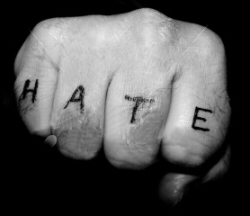Over the past few months, the Philippine LGBT Hate Crime Watch has compiled records and reports of the violent deaths of LGBT Filipinos from 1996 to the present. As we continue to share these data with fellow LGBT activists and human rights advocates, we have encountered recurring questions, including: How do we know if these acts are hate crimes? What are hate crimes, anyway?
 According to Preventing and responding to hate crimes,1a publication from the Organization for Security and Co-operation in Europe (OSCE) Office for Democratic Institutions and Human Rights, an act can be considered a “hate crime” if it (1) “constitutes an offence under criminal law”; and if (2) “in committing the crime, the perpetrator acts on the basis of prejudice or bias.” Perpetrators of such crimes select their victims because of their negative opinions, intolerance or hatred towards the members of a social group on the basis of any of the following characteristics: race, ethnicity, language, religion, nationality, sexual orientation, gender identity or other status.
According to Preventing and responding to hate crimes,1a publication from the Organization for Security and Co-operation in Europe (OSCE) Office for Democratic Institutions and Human Rights, an act can be considered a “hate crime” if it (1) “constitutes an offence under criminal law”; and if (2) “in committing the crime, the perpetrator acts on the basis of prejudice or bias.” Perpetrators of such crimes select their victims because of their negative opinions, intolerance or hatred towards the members of a social group on the basis of any of the following characteristics: race, ethnicity, language, religion, nationality, sexual orientation, gender identity or other status.
Hate crimes are also known as bias crimes. The U.S. Department of Justice Training Guide for Hate Crime Data Collection2underscores the role of bias in the following definition of hate crime: “a criminal offense committed against a person or property which is motivated, in whole or in part, by the offenders’ bias against a race, religion, disability, ethnicity/national origin, or sexual orientation.”
Stonewall UK’s publication, Homophobic hate crime: The Gay British Crime Survey 20083, presents yet another definition of hate crime taken from the UK’s Association of Chief Police Officers (ACPO). It is: “any hate incident, which constitutes a criminal offence, perceived by the victim or any other person as being motivated by prejudice or hate.” The document further clarifies that “hate incident” is defined as “any incident, which may or may not constitute a criminal offence, which is perceived by the victim or any other person as being motivated by prejudice or hate.”
Unfortunately, our Pilipinas has neither official policies nor rigorous studies on the issue of hate crimes. Prejudice, bias, or hate towards any minority group (such as LGBT Filipinos, Indigenous Filipinos, Filipinos of Foreign Descent, Filipinos from non-major religions) are not at all considered when investigating crimes. The absence of an established mechanism in our country to prevent, identify, or resolve hate crimes does not mean they do not happen. It does mean that, if and when hate crimes happen to members of a minority group, the authorities do not recognize them and deal with them as such.
The alarming number of LGBT Filipinos who have been killed in recent years is strongly indicative that hate crimes may indeed be happening. As of this year alone, twenty-eight LGBT Filipinos have been murdered. Twenty-nine were reported to have been murdered last year. Looking at available reports for the past twenty-five years, we found that 103 LGBT Filipinos have been murdered from 1996 to the present.
The brutalities done to the murdered LGBT Filipinos also suggest that they were victims of hate crime. Thirty-six of the victims were stabbed multiple times. Six were tortured before they were killed. Others were raped, or killed with a blunt object, or suffocated, or dismembered, or burned alive.
It is important to note that hate crimes are not limited to murder. There may be an even greater number of crimes—theft, assault, rape–committed against members of minority groups because of the prejudice, bias, or hate against them.
Now is the time to uncover the truth. We call on our government to conduct a national inquiry on crimes involving victims who were known or perceived to be a member of a minority group, and to investigate the possibility that these crimes were motivated by prejudice.
The Philippine LGBT Hate Crime Watch is thankful to all its members, advisers, and supporters. We are also grateful for Rep. Teddy Casino’s call for a congressional inquiry on the murders recorded in the Watch’s database. That is a start.
But for this advocacy to succeed, we call on all elected officials, individuals, advocates, and organizations who value human rights above all. People who will do all they can to protect, promote, and fulfill eveyone’s human rights without prejudice, bias, or hate against any sector or group. Despite all that divides us, we must unite so that all of us will live and grow in liberty, equality, and justice.
There is hope that the nature, occurrence, perpetrators, and targets of hate crimes in the Philippines will be better understood. Greater hope still that marginalized and stigmatized sectors of Philippine society will be protected and given justice when victimized. And this hope may come to fruition if all of us work together.
You may download resource materials on hate crime and human rights from this link:
https://skydrive.live.com/redir.aspx?cid=11a3f2713fdfa524&resid=11A3F2713FDFA524%21119
[1] Organization for Security and Co-operation in Europe’s Office for Democratic Institutions and Human Rights. (2009). Preventing and responding to hate crimes: A resource guide for NGOs in the OSCE region. Retrieved from http://www.osce.org/odihr/39821
[2] U.S. Department of Justice. (1996). Training guide for hate crime data collection. Retrieved from http://www.fbi.gov/about-us/cjis/ucr/hate-crime/trainguidedc99.pdf
[3] Dick, S. (2008). Homophobic hate crime: The Gay British crime survey. Retrieved from http://www.stonewall.org.uk/documents/homophobic_hate_crime__final_report.pdf

